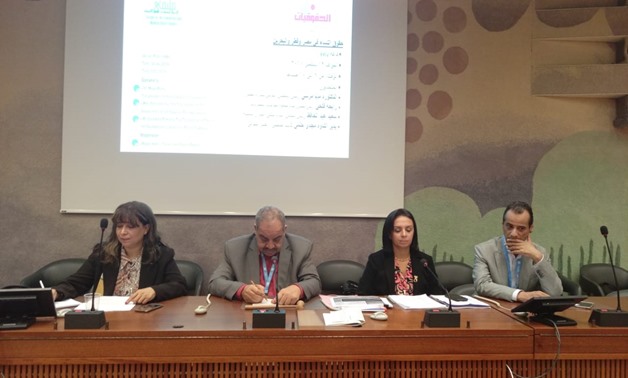
The panel of the seminar on women's rights - Egypt Today
GENEVA – 12 September 2018: Under the chairmanship of Maya Morsi, President of the National Council of Women (NCW), a seminar on the rights on women in Egypt, Qatar and Bahrain revealed that the Qatari government exercises blatant discrimination against Qatari women. Even more so, the session revealed that Qatar has not attempted to improve the situation of women in Qatar, who remain voiceless and under-represented.
.jpeg) The Seminar discussing human rights issues in Egypt, Qatar and Bahrain - Egypt Today
The Seminar discussing human rights issues in Egypt, Qatar and Bahrain - Egypt Today
During the seminar, which was held on the margin of the 39th Session of the International Council for Human Rights, Said Abdel Hafez, Chairperson of the Forum for Development and Human Rights Dialogue, stated, “Article 12 of Qatar's Nationality Law No. 38 of 2005 recognizes racial discrimination against non-Qataris,” continuing, “Article 16 of the Nationality Law [No. 38 of 2005] also affirms the unequal status between citizens of Qatari origin and naturalized citizens.”
The shocking inequality that exists within Qatar has also been called out by its own governmental entities. In fact, Abdel Hafez explained, “The Qatari National Human Rights Committee, a government committee, has reported blatant and shocking discrimination between men and women [in Qatar].”
.jpeg) The panel of the seminar on women's rights - Egypt Today
The panel of the seminar on women's rights - Egypt Today
The UN Committee on the Elimination of Racial Discrimination has called on Qatar to define racial discrimination in its legislation, Abdel Hafez pointed out, clarifying that the worryingly low number of female judges compared to their male counterparts has left the UN Committee on the Elimination of Racial Discrimination’s Special Rapporteur from the concerned.
“Out of some 200 judges, there are only 2 female judges in Qatar,” said Abdel Hafez, explaining, “ The Special Rapporteur on the independence of judges and lawyers expressed concern regarding the low number of female judges serving in Qatar.”
.jpeg) A side of the seminar of women's rights - Egypt Today
A side of the seminar of women's rights - Egypt Today
On her end, Rabha Fathy, Chairperson of the Association of the Egyptian Female Lawyers (AEFL), said that women’s participation in the political sphere is one of the most important tools that enable society to change. This, Fathy explained, is what happened after President Abdel Fatah al-Sisi named 2017 the Year for Egyptian Women; a call that carried forward the importance of women’s struggles in Egypt and illustrated the President’s belief in the importance of women’s participation in the public and political spheres, explains Fathy.
Moving on to Bahrain, Fathy said, “Bahrain has joined all international conventions that guarantee women's rights since the 1990s,” explaining that Bahrain has worked to take all steps towards ensuring women are well-represented and are able to enter all public and political spheres as equals to men. “The Bahraini leadership in Bahrain has put in place a number of initiatives and programs to support the participation of Bahraini women [in the public sphere].”
“Women in Bahrain are represented in all levels of the Kingdom.”
.jpeg)
.jpeg)
.jpeg)
Comments
Leave a Comment